18种特殊反义疑问句及练习
(完整word版)反义疑问句练习题(附答案).doc
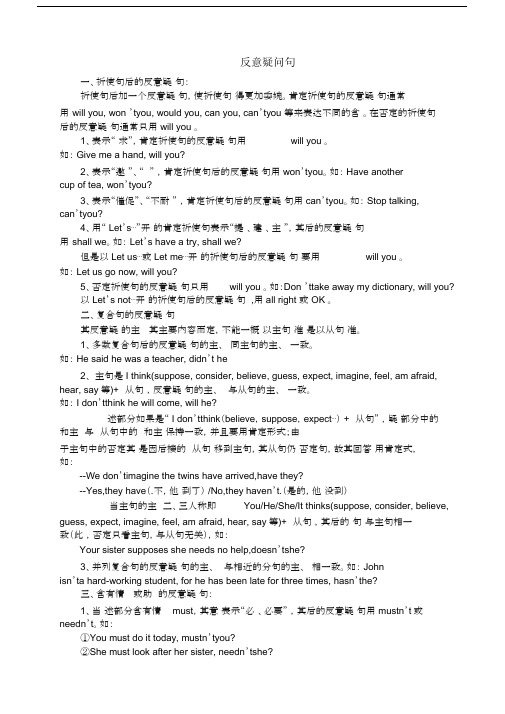
反意疑问句一、祈使句后的反意疑句:祈使句后加一个反意疑句,使祈使句得更加委婉。
肯定祈使句的反意疑句通常用will you, won ’tyou, would you, can you, can’tyou 等来表达不同的含。
在否定的祈使句后的反意疑句通常只用 will you 。
1、表示“ 求”,肯定祈使句的反意疑句用will you 。
如: Give me a hand, will you?2、表示“邀”、“ ” ,肯定祈使句后的反意疑句用 won’tyou。
如: Have anothercup of tea, won’tyou?3、表示“催促”、“不耐” ,肯定祈使句后的反意疑句用 can’tyou。
如: Stop talking,can’tyou?4、用“ Let’s⋯”开的肯定祈使句表示“提、建、主”,其后的反意疑句用shall we。
如: Let’s have a try, shall we?但是以 Let us⋯或 Let me⋯开的祈使句后的反意疑句要用will you 。
如: Let us go now, will you?5、否定祈使句的反意疑句只用will you 。
如:Don ’ttake away my dictionary, will you?以Let’s not⋯开的祈使句后的反意疑句 ,用 all right 或 OK 。
二、复合句的反意疑句其反意疑的主其主要内容而定,不能一概以主句准是以从句准。
1、多数复合句后的反意疑句的主、同主句的主、一致。
如: He said he was a teacher, didn’t he2、主句是 I think(suppose, consider, believe, guess, expect, imagine, feel, am afraid, hear, say等)+从句,反意疑句的主、与从句的主、一致。
如: I don’tthink he will come, will he?述部分如果是“ I don’tthink(believe,suppose,expect⋯) +从句” ,疑部分中的和主与从句中的和主保持一致,并且要用肯定形式;由于主句中的否定其是因后接的从句移到主句,其从句仍否定句,故其回答用肯定式,如:--We don’timagine the twins have arrived,have they?--Yes,they have(.不,他到了) /No,they haven’t.(是的,他没到)当主句的主二、三人称即You/He/She/It thinks(suppose, consider, believe, guess, expect, imagine, feel, am afraid, hear, say等)+从句,其后的句与主句相一致(此,否定只看主句,与从句无关),如:Your sister supposes she needs no help,doesn’tshe?3、并列复合句的反意疑句的主、与相近的分句的主、相一致。
英语20种特殊的反意疑问句
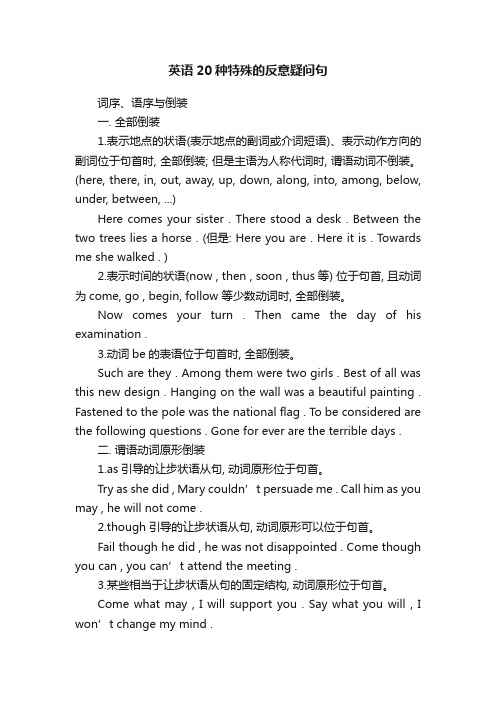
英语20种特殊的反意疑问句词序、语序与倒装一. 全部倒装1.表示地点的状语(表示地点的副词或介词短语)、表示动作方向的副词位于句首时, 全部倒装; 但是主语为人称代词时, 谓语动词不倒装。
(here, there, in, out, away, up, down, along, into, among, below, under, between, ...)Here comes your sister . There stood a desk . Between the two trees lies a horse . (但是: Here you are . Here it is . Towards me she walked . )2.表示时间的状语(now , then , soon , thus等) 位于句首, 且动词为come, go , begin, follow 等少数动词时, 全部倒装。
Now comes your turn . Then came the day of his examination .3.动词be的表语位于句首时, 全部倒装。
Such are they . Among them were two girls . Best of all was this new design . Hanging on the wall was a beautiful painting . Fastened to the pole was the national flag . To be considered are the following questions . Gone for ever are the terrible days .二. 谓语动词原形倒装1.as引导的让步状语从句, 动词原形位于句首。
Try as she did , Mary couldn’t persuade me . Call him as you may , he will not come .2.though引导的让步状语从句, 动词原形可以位于句首。
反义疑问句练习题目及答案
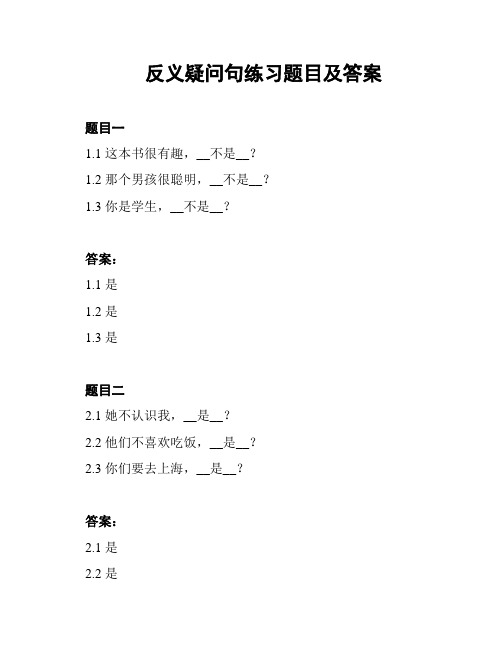
反义疑问句练习题目及答案题目一1.1 这本书很有趣,__不是__?1.2 那个男孩很聪明,__不是__?1.3 你是学生,__不是__?答案:1.1 是1.2 是1.3 是题目二2.1 她不认识我,__是__?2.2 他们不喜欢吃饭,__是__?2.3 你们要去上海,__是__?答案:2.1 是2.2 是2.3 是题目三3.1 他不喜欢看电视,__是__?3.2 你不觉得这个问题很有意思,__是__?3.3 她没去过北京,__是__?答案:3.1 是3.2 是3.3 是题目四4.1 他们不会唱歌,__是__?4.2 这是个好主意,__不是__?4.3 他喜欢看电影,__不是__?答案:4.1 是4.2 不是4.3 不是题目五5.1 她不懂汉语,__是__?5.2 你会游泳,__是__?5.3 他们喜欢吃饭,__是__?答案:5.1 是5.2 是5.3 是题目六6.1 这不是你的手机,__是__?6.2 你不喜欢这个颜色,__是__?6.3 他们会来参加聚会,__是__?答案:6.1 是6.2 是6.3 是题目七7.1 他没有听说过这个地方,__是__?7.2 你不想去旅行,__是__?7.3 她知道这个答案,__是__?答案:7.1 是7.2 是7.3 是题目八8.1 我今天晚上有时间,__不是__?8.2 他没有考试,__是__?8.3 你们都明白这个问题,__是__?答案:8.1 不是8.2 是8.3 是。
反义疑问句练习题及答案解析

反义疑问句练习题及答案解析反义疑问句是英语语法中的一种问句形式,用于在表达某种观点或态度时,征求对方的认同或否认。
反义疑问句通常由两个部分组成,主句和从句,其中主句陈述事实,并以逗号结尾,从句是对主句的反问。
以下是一些反义疑问句的练题及答案解析:1. He is a doctor, isn't he?答案:是解析:句子的主语是 "He",陈述了 "He" 是一个医生。
主句以逗号结尾,从句表达了 "He" 是一个医生这一观点,并征求对方的认同。
2. They don't like coffee, do they?答案:否解析:句子的主语是 "They",陈述了 "They" 不喜欢咖啡。
主句以逗号结尾,从句表达了 "They" 不喜欢咖啡这一观点,并征求对方的否认。
3. You can swim, can't you?答案:是解析:句子的主语是 "You",陈述了 "You" 能游泳。
主句以逗号结尾,从句表达了 "You" 能游泳这一观点,并征求对方的认同。
4. She hasn't finished her homework, has she?答案:否解析:句子的主语是"She",陈述了"She" 没有完成她的作业。
主句以逗号结尾,从句表达了 "She" 没有完成她的作业这一观点,并征求对方的否认。
5. He won't be late, will he?答案:否解析:句子的主语是 "He",陈述了 "He" 不会迟到。
主句以逗号结尾,从句表达了"He" 不会迟到这一观点,并征求对方的否认。
反义疑问句讲解与练习

反义疑问句讲解与练习一、含be(is, are, was, were)动词的反意疑问句(1)句型1:主语+ be+其它,isn’t(aren’t, wasn’t, weren’t)+ 主语?句型2:主语+ be not+其它,is(are, was, were) + 主语?① You are from America, aren’t you? Yes, I am. No, I’m not.② It isn’t very cold today, is it? Yes, it is. No,it isn’t.(2)注意:There be句型例:There is an old picture on the wall, isn’t there?二、带行为动词反意疑问句(不含be和情态动词)句型1:主语+动词+其他,do/did/does + not +主语?句型2:主语+did/does/do+not +动词原形+其他,did/do/does+其他?例:You often watch TV in the evening, don’t you? Yes, I do. No, I don’t.三、含有情态动词的反意疑问句,反义疑问句中的动词使用情态动词。
例:The students must study hard, mustn’t they? Yes, they must. No, they needn’t.注意:You must go home now, needn’t you? Yes, I must. No, I needn’t.★注意:There be句型的一般将来时① There will be a basketball match tomorrow, won’t there?Yes, there will. No, there won’t.② There won’t be too much pollution in the future, will there?Yes, there will. No, there won’t.四、反义疑问句的回答:答语要和实际情况相符合,遵循“实事求是”的原则。
25种反义疑问句的特殊用法及练习2022届高考英语二轮专题
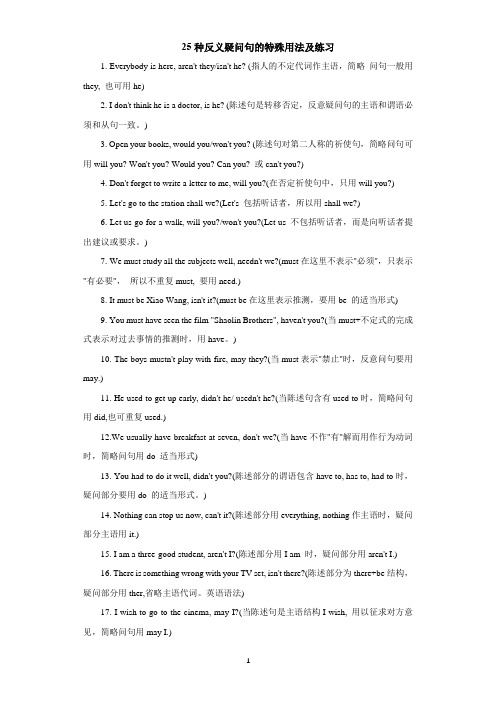
25种反义疑问句的特殊用法及练习1. Everybody is here, aren't they/isn't he? (指人的不定代词作主语,简略问句一般用they, 也可用he)2. I don't think he is a doctor, is he? (陈述句是转移否定,反意疑问句的主语和谓语必须和从句一致。
)3. Open your books, would you/won't you? (陈述句对第二人称的祈使句,简略问句可用will you? Won't you? Would you? Can you? 或can't you?)4. Don't forget to write a letter to me, will you?(在否定祈使句中,只用will you?)5. Let's go to the station shall we?(Let's 包括听话者,所以用shall we?)6. Let us go for a walk, will you?/won't you?(Let us 不包括听话者,而是向听话者提出建议或要求。
)7. We must study all the subjects well, needn't we?(must在这里不表示"必须",只表示"有必要",所以不重复must, 要用need.)8. It must be Xiao Wang, isn't it?(must be在这里表示推测,要用be 的适当形式)9. You must have seen the film "Shaolin Brothers", haven't you?(当must+不定式的完成式表示对过去事情的推测时,用have。
初中英语反意疑问句30题
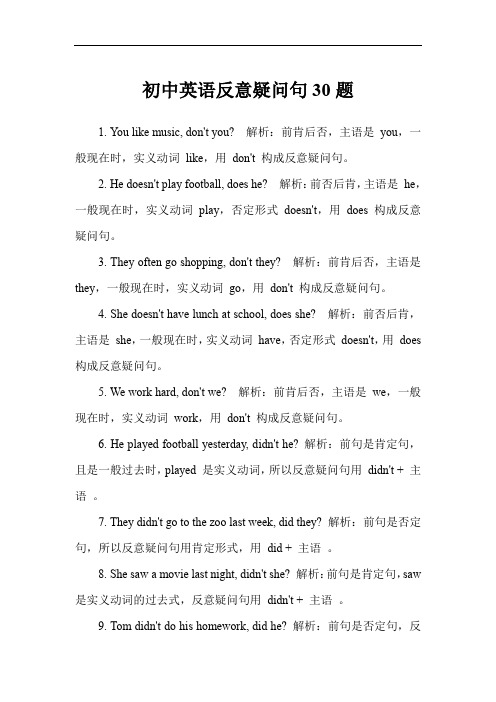
初中英语反意疑问句30题1. You like music, don't you? 解析:前肯后否,主语是you,一般现在时,实义动词like,用don't 构成反意疑问句。
2. He doesn't play football, does he? 解析:前否后肯,主语是he,一般现在时,实义动词play,否定形式doesn't,用does 构成反意疑问句。
3. They often go shopping, don't they? 解析:前肯后否,主语是they,一般现在时,实义动词go,用don't 构成反意疑问句。
4. She doesn't have lunch at school, does she? 解析:前否后肯,主语是she,一般现在时,实义动词have,否定形式doesn't,用does 构成反意疑问句。
5. We work hard, don't we? 解析:前肯后否,主语是we,一般现在时,实义动词work,用don't 构成反意疑问句。
6. He played football yesterday, didn't he? 解析:前句是肯定句,且是一般过去时,played 是实义动词,所以反意疑问句用didn't + 主语。
7. They didn't go to the zoo last week, did they? 解析:前句是否定句,所以反意疑问句用肯定形式,用did + 主语。
8. She saw a movie last night, didn't she? 解析:前句是肯定句,saw 是实义动词的过去式,反意疑问句用didn't + 主语。
9. Tom didn't do his homework, did he? 解析:前句是否定句,反意疑问句用肯定形式did + 主语。
反意疑问句-18
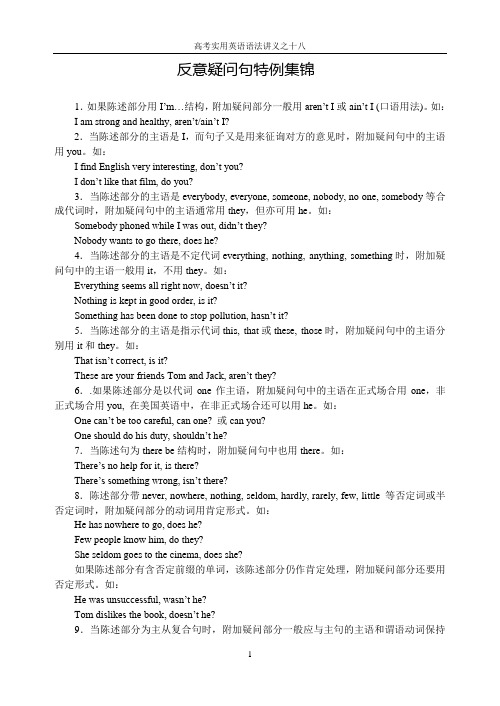
反意疑问句特例集锦1.如果陈述部分用I’m…结构,附加疑问部分一般用aren’t I或ain’t I (口语用法)。
如:I am strong and healthy, aren’t/ain’t I?2.当陈述部分的主语是I,而句子又是用来征询对方的意见时,附加疑问句中的主语用you。
如:I find English very interesting, don’t you?I don’t like that film, do you?3.当陈述部分的主语是everybody, everyone, someone, nobody, no one, somebody等合成代词时,附加疑问句中的主语通常用they,但亦可用he。
如:Somebody phoned while I was out, didn’t they?Nobody wants to go there, does he?4.当陈述部分的主语是不定代词everything, nothing, anything, something时,附加疑问句中的主语一般用it,不用they。
如:Everything seems all right now, doesn’t it?Nothing is kept in good order, is it?Something has been done to stop pollution, ha sn’t it?5.当陈述部分的主语是指示代词this, that或these, those时,附加疑问句中的主语分别用it和they。
如:That isn’t correct, is it?These are you r friends Tom and Jack, aren’t they?6..如果陈述部分是以代词one作主语,附加疑问句中的主语在正式场合用one,非正式场合用you, 在美国英语中,在非正式场合还可以用he。
- 1、下载文档前请自行甄别文档内容的完整性,平台不提供额外的编辑、内容补充、找答案等附加服务。
- 2、"仅部分预览"的文档,不可在线预览部分如存在完整性等问题,可反馈申请退款(可完整预览的文档不适用该条件!)。
- 3、如文档侵犯您的权益,请联系客服反馈,我们会尽快为您处理(人工客服工作时间:9:00-18:30)。
英语18种特殊的反意疑问句1.祈使句。
祈使句后一般加上will you或won't you构成反意疑问句,用will you 多表示“请求”,用won't you 多表示提醒对方注意。
例如:Look at the blackboard, will you/ won't you?看黑板,好吗?Let引导的祈使句有两种情况:1)Let's...,后的反意疑问句用shall we或shan't we。
例如:Let's go home, shall we/ shan't we? 回家吧,好吗?还可以用may I来表示征求对方的同意或许可。
2)Let us/me...后的反意疑问句用will you或won't you。
例如:Let me have a try, will you/won't you? 让我试一试,行吗?2.感叹句。
感叹句后加反意疑问句时,其反意疑问句需用be的一般现在时态的否定形式。
例如:What fine weather, isn't it? 多好的天气啊,是吧?3. 当陈述部分谓语动词是need, dare, used to,且这些词被用作实义动词时,其反意疑问句需用do的适当形式。
例如:He needs help, doesn't he?他需要帮助,是吗?4.陈述部分主、谓语是I am...时,反意疑问句用aren't I 或ain'tI ,而不是am not I (可用am I not)。
例如:I'm working now, ain't I? 我在工作,是吗?5.陈述部分的主语是everything, nothing, anything或something时,反意疑问句的主语应用代词it。
例如:Something is wrong with my radio, isn't it? 我的收音机出毛病了,是吧?6.陈述部分的主语是 everybody, everyone, anybody, anyone,somebody, someone, nobody, no one, none, neither 时, 其反意疑问句的主语需用复数代词they。
例如:Everyone is here, aren't they? 大家都到了,是吗?No one knows about it, do they? 没有人知道这件事,对吗?7.陈述部分的主语是指示代词this或that时,反意疑问句的主语用it,当陈述部分的主语是指示代词these或those时,其反意疑问句的主语用they。
例如:This is a plane, isn't it? 这是一架飞机,是吗?These are grapes,aren't they? 这些是葡萄,是吗?8.陈述部分的主语是不定代词one时,反意疑问句的主语可以用one,也可用you(美式英语用he)。
例如:One should be ready to help others, shouldn't one? 每个人都应该乐于助人,是吧?9.当陈述部分含有以下这些含有否定意义的词时:few, little,seldom,hardly, never, not, no, no one, nobody, nothing, none,neither等,其反意疑问句需用肯定结构。
例如:He is never late for school, is he? 他上学从不迟到,是吗?10.当陈述部分所含的否定词是通过加前缀或后缀构成的,其后的反意疑问句依然用否定结构。
例如:It is unfair, isn't it? 这不公平,是吧?11.含有否定含义的词在陈述部分作动词的宾语时,其反意疑问句用肯定结构,也可以用否定结构。
例如:You got nothing from him, did you? 你从他那儿什么也没得到,是吗?12.当陈述部分主语是从句、不定式(短语)、动词-ing形式时,反意疑问句的主语应该用it。
例如:What you need is more important, isn't it?你需要的东西更重要,是吧?13.当陈述部分含I think (believe, suppose...)that... 结构时,其反意疑问句须与从句的主、谓语保持一致,注意主句的主语必须是第一人称。
例如:I don't think he will come, will he? 我认为他不会来,对吗?14.have(has)不是表示“有”的意思,并在句中做谓语时,其反意疑问句的助动词要用do, does, did。
例如:They had a meeting just now,didn't they? 他们刚才开了个会,是吗?15.陈述部分有have to 时,其反意疑问句要用助动词的否定形式。
例如:You have to water the vegetables every day, don't you?你每天都要浇菜,对吧?16.陈述部分是there be句型时,其反意疑问句中要用there。
例如:There was a hospital here, wasn't there? 过去这儿有家医院,是吗?17.陈述部分有had better时,反意疑问句中要用hadn't。
例如:We had better go to school at once, hadn't we? 我们现在最好马上去上学,好吗?18.当陈述部分含有情态动词must时,我们便要分析一下must的含义。
如果must 作“一定;要;必须”讲,反意疑问句须用mustn't或needn't;而当must作推测意义“一定是;必定”讲时,反意疑问句则需根据must后的动词原形选用相应的形式。
例如:He must work hard at physics, mustn't he? 他必须努力学物理,是吧?Tom must be at home,isn't he? 汤姆一定在家,是吧?19.关于宾语从句的反义疑问句,分以下几种情况:1)、主句的主语为第一人称(I、we),此时反义疑问句应与从句一致。
e.g.I think he is right,isn't he ?这种情况下,如果存在否定前移,应先把否定转移到从句处,再做反义疑问句。
方法仍是肯定句的方法。
2)、(1)主句的主语为第二、三人称时,反义疑问句与主句一致。
特别要提到的是,否定前移只适用于主语为第一人称的时候,所以此时不存在前移的问题,主句肯定就是肯定,否定就是否定,不必考虑其他。
e.g.They think he is right ,don't they?They don't think he is right,do they?(2)时态问题:主句如果是一般过去时等,时态与主句时态保持一致。
e.g.I told them that I had received some letters thatday,didn't I ?此时反义疑问句中的“I”是宾语从句的主语,人称仍应与宾语从句保持一致。
如何回答反意疑问句在回答的时候,如果是前肯后否的句子,思维和中国人相同;如果是前否后肯的句子,思维正好同中国人相反:He is a student, isn't he? (他是个学生,不是吗?)Yes, he is.(是的,他是学生)No, he isn't.(不是,他不是学生)He doesn't like playing football, does he?(他不喜欢踢球,是吗?)Yes, he does.(不是,他喜欢踢球)No, he doesn't.(是的,他不喜欢踢球)I am not a teacher, am I? (我不是一名老师,是吗?Yes, I am.(不是,我是一名老师)No, I am not.(是的,我不是一名老师)。
5。
最后就是,在回答的时候,不允许 Yes,.....not.或者 No,+ 肯定的。
反意疑问句练习题一、选择最佳答案填空1、The poor man needs our help, ______ he?A. needB. needn’tC. doesD. doesn’t2、He’s never watched such an important watch, ______?A. hasn’t heB. has heC. isn’t heD. is he3、You have few friends, ______?A. haven’t youB. have youC. you haveD. you haven’t4、Tom has supper at school, ______?A. hasn’t heB. has heC. doesn’tD. does he5、He’s almost finished ______ the book, ______ he?A. reading, isn’tB. to read, isn’tC. reading, hasn’tD. to read, hasn’t6、You were on the farm yesterday, ______ you?A. didn’tB. don’tC.can’tD. weren’t7、Don’t close the window, ______ you?A. didB. willC. wasD. won’t8、Let’s go shopping, ______ we?A. shallB. willC. wasD. is9、Joan’s late for school,______?A. wasn’t sheB. hasn’t sheC. isn’t sheD. doesn’t she10、The meeting will begin at half past two in the afternoon, ______.A. does itB. doesn’t itC. will itD. won’t it11、The sick man’s allowed to take a walk in the garden every day, ______?A. is heB. isn’t heC. has heD. hasn’t he12、There are few people on the playground, ______?A. are thereB. are theyC. has heD. hasn’t he13、Tom could hardly work out the maths problem, ______ he?A. couldn’tB. couldC. didn’tD. did14、Let’s go to the island, ______?A. won’t youB. will youC. shall weD. will we15、Don’t forget to give Polly some food and change he water, ______?A. will youB. shall weC. won’t youD. do you16、There are few people on that village, ______ there?A. didB. doesC. wasD. are17、She is too young to go to school, ______ she?A. didn’tB. doesC. wasn’tD. is18、John had to join a long queue to get a ticket, ______?A. did heB. didn’t heC. had heD. hadn’t he19、--Your blouse is yellow, isn’t it? --______.A. Yes, it is.B. It's red.C. I'm not sure.D.I don’t know.20、You have met before, ______?A. haven’t youB. have youC. do youD. don’t you21、Allen has never been to Beijing, ______?A. has sheB. hasn’t sheC. has AllenD. hasn’t he二、完成下列反意疑问句1、He has a lot of work to do, ______ ______?2、Uncle Wang forgot to bring your bag, ______ ______?3、There’re more than ten pandas on the hill, ______ ______?4、Tom wants to get his TV set back, ______ ______?5、It’s fine today, ______ ______?6、Lima’s just come back from America, ______ ______?7、Mary bought some shampoo in the supermarket,______ ______?8、Nobody was looking for me, ______ ______?9、He needs our help, ______ ______?10、We must study English hard or we can't be good at it, ______ ______?11、You may use his eraser, ______ ______?12、He did n’t say you were foolish, ______ ______?13、They’ll be on duty next Monday,______ ______?14、Tom didn’t watch TV last night, ______ ______?15、She’s been to Shanghai, ______ ______?16、Open the windows, ______ ______?17、That’s a model plant,______ ______?18、Robert knows little Chinese, ______ ______?19、What an interesting story, ______ ______?20、Your parents must be in the library, ______ ______?21、You don’t think he will come back before school, ______ ______?22、You’d better do it n ow, ______ ______?23、Everything is ready for the party,______ ______?24、They usually play football after school, ______ ______?25、Mary made few mistakes in the exam, ______ ______?26、He has never seen her before, ______ ______?27、Jack hardly goes to the cinema, ______ ______?28、There’re twenty-one girl students in your class, ______ ______?29、Miss Green is going to work in London, ______ ______?30、There’s going to be a meeting this afternoon,______ ______?31、You had a talk with John just now, ______ ______?32、Lucy had a party last Sunday, ______ ______?33、It’s going to rain this afternoon, ______ ______?34、Mr. Green bought nothing yesterday, ______ ______?35、Let’s sing an English song together, ______ ______?36、Let me try it a second time, ______ ______?反意疑问句考点反意疑问句是高考重要考点,其构成形式是"肯定 + 否定"和"否定 + 肯定",但也有一些特例。
